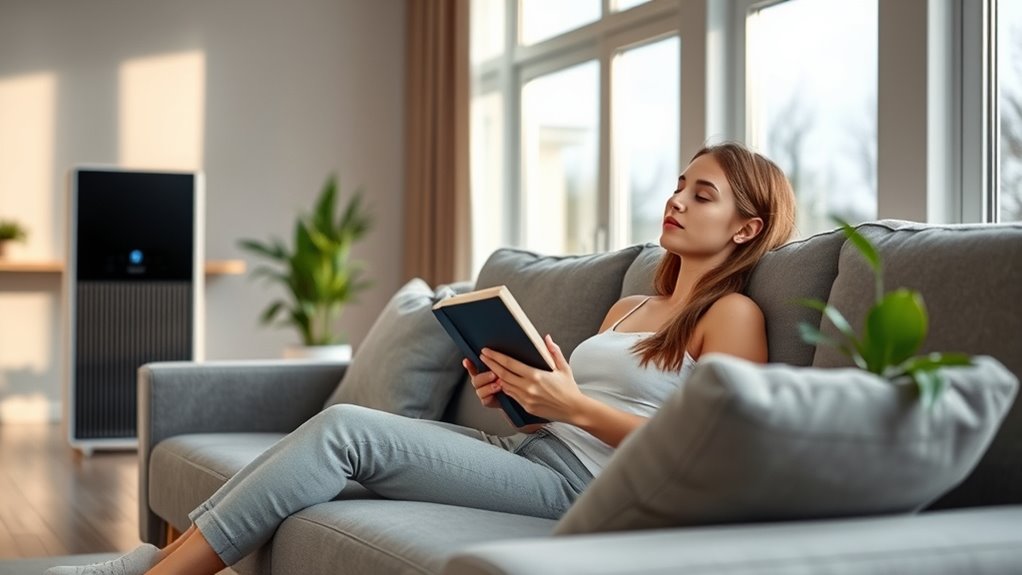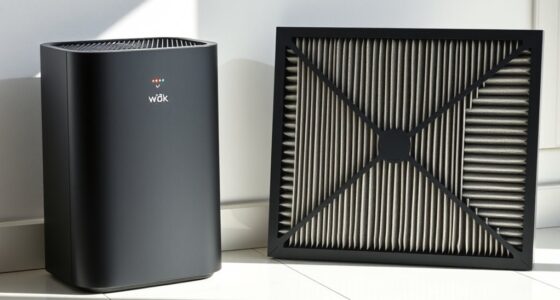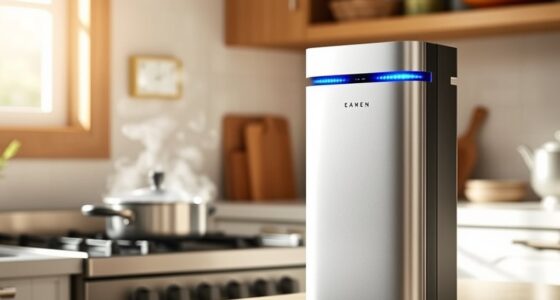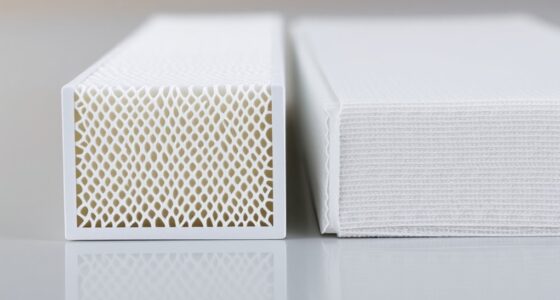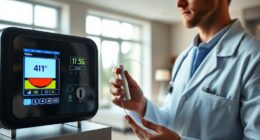Using air purifiers isn’t always better for your immune system. While they help remove harmful pollutants, over-reliance on them can create an overly sterile indoor environment. This limits your exposure to beneficial microbes that teach your immune system how to distinguish threats from harmless substances. Constant sterilization may even weaken immune development and increase allergies. If you want a healthy balance between cleanliness and microbial exposure, there’s more to contemplate—keep exploring to learn how to support your immunity effectively.
Key Takeaways
- Excessive sterilization and reliance on air purifiers can reduce beneficial microbial exposure, potentially impairing immune development.
- The hygiene hypothesis suggests that overly sterile environments may increase allergies and autoimmune conditions.
- Air purifiers effectively remove pollutants but may hinder immune training if overused in clean, microbial-free settings.
- Balanced hygiene practices, including outdoor activities and pet interactions, support healthy immune system learning.
- Complete sterilization isn’t necessary; maintaining microbial diversity promotes immune resilience and overall health.
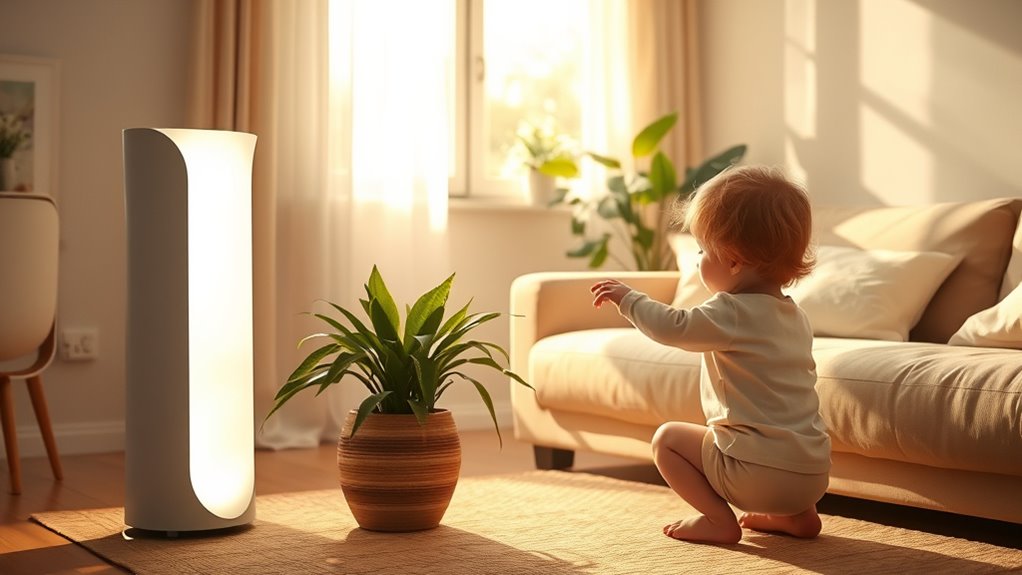
Many people believe that keeping everything ultra-clean is always better for health, but this isn’t necessarily true. In fact, over-sterilizing your environment might actually hinder your immune development. This idea is rooted in the hygiene hypothesis, which suggests that a lack of exposure to microbes in early life can lead to increased allergies, asthma, and autoimmune conditions. When you constantly sanitize your surroundings or rely heavily on air purifiers, you may prevent your immune system from encountering the diverse range of microorganisms it needs to learn how to distinguish between harmless and harmful agents. Without this early exposure, your immune defenses might become hypersensitive, reacting to substances that aren’t dangerous at all.
Air purifiers are marketed as devices that improve indoor air quality by removing dust, pollen, mold, and other pollutants. While these are beneficial in certain contexts, overusing them or relying on them excessively can contribute to a state of overly sterile indoor environments. Instead of promoting a healthy immune system, this could inadvertently suppress immune development. When your immune system doesn’t get the chance to encounter and adapt to various microbes, it may become less efficient in fighting off real threats or may overreact to benign substances. Essentially, air purifiers might be doing more harm than good if they eliminate too many of the microbes necessary for immune training.
The key is balance. You don’t need to abandon all hygiene practices, but you should be mindful about not overdoing it. Regular cleaning is essential for preventing the spread of harmful pathogens, but it shouldn’t turn into an obsessive effort to eliminate every possible microbe. Incorporating natural microbial exposure—like spending time outdoors, interacting with pets, or gardening—can support healthy immune development. These activities introduce your immune system to a variety of microorganisms that help it learn how to differentiate between harmless and dangerous agents. Additionally, understanding the importance of microbial diversity can help you find the right balance between cleanliness and immune health.
Frequently Asked Questions
Can Using Air Purifiers Eliminate All Indoor Allergens?
Using air purifiers can’t eliminate all indoor allergens, but they considerably improve allergen removal. Their air filtration efficiency depends on the filter type and room size, so choosing the right purifier is key. While they reduce dust, pollen, and pet dander, some allergens may still linger. To maximize allergen removal, combine air purifiers with regular cleaning and ventilation, ensuring a healthier indoor environment for you.
Do Air Purifiers Produce Harmful Ozone or Emissions?
Ever wondered if air purifiers produce harmful emissions? Some models, especially those with ozone generators, can release ozone, raising ozone safety and emission concerns. While most modern purifiers use HEPA filters and produce no ozone, it’s essential to check the product details. Are you prioritizing air quality or risking unintended emissions? Always choose units with low or no ozone output to guarantee your home’s air remains safe and clean.
How Often Should I Replace or Clean Air Purifier Filters?
You should regularly check your air purifier’s filter, following the manufacturer’s filter maintenance and replacement schedules. Typically, HEPA filters need replacing every 6 to 12 months, while carbon filters might last 3 to 6 months. Keep an eye on filter color and airflow, and clean pre-filters monthly if applicable. Proper maintenance guarantees maximum performance, keeps the air clean, and prevents potential emissions or reduced efficiency.
Are There Specific Air Purifiers Recommended for Children or Pets?
When selecting air purifiers for children or pets, emphasize models with certified child safety features and pet-friendly filters. Look for units with low noise levels and secure covers to prevent accidental exposure. You should also consider purifiers with HEPA filters that trap allergens and pet dander, improving overall pet health and child safety. Always follow manufacturer instructions for safe use and maintenance to guarantee maximum protection.
Can Air Purifiers Help Prevent Respiratory Illnesses Effectively?
Ever wondered if air purifiers can truly prevent respiratory illnesses? They can help by reducing airborne pollutants, allergens, and irritants, supporting your immune system’s defense. While they aren’t a guarantee, using an air purifier aids in allergy prevention and keeps indoor air cleaner. Regular maintenance is key, and combining purifiers with other healthy habits boosts your overall respiratory health. So, aren’t safer, cleaner air worth trying?
Conclusion
Don’t let the myth of “being too clean” scare you away from air purifiers. Research shows that over 80% of indoor air contains pollutants that can harm your health, especially for children and allergy sufferers. Air purifiers help reduce these risks without weakening your immune system. Instead of avoiding clean environments, focus on balanced hygiene—clean, but not obsessively so. Your lungs and immune health will thank you for it.
